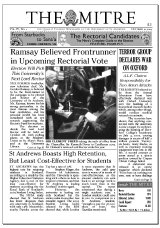|

A B O U
T T H E M I T R E
The Mitre is the quality student
newspaper at the University of St Andrews, the third-oldest university
in the English-speaking world... more
C O N T
A C T U S
All correspondence should
be sent to themitre@gmail.com.
D I G I T A L A R C H I V E S
Editions of the Mitre generally are available
online one month after they appear in print... more
|
|

Reform
Graduation!
This
past week many of our friends and peers enjoyed the pomp and ceremony
of the Graduation Ceremony, and so this seems an appropriate moment to
make a series of recommendations for its embellishment and elaboration.
We firmly believe that much would be gained were the ritual made more
obsolete, if more Latin was used (thereby making the procedure less
intelligible), and if medieval traditions were restored with the aim of
increasing wining (poculum) and dining (bellaria), things indispensable
but not currently obligatory at St. Andrews, as they were in days of
yore.
The necessary historical background to the graduation ceremony is
straightforward. St. Andrews was established along the lines of the
great university at Paris, and our ceremony, as our syllabus, was
essentially a replica. At the time of the Protestant Revolution, many
of the more enjoyable aspects of graduation were replaced by extremely
dull ones. For instance, it had been an obligation for a new magister
to entertain his teachers lavishly with a sumptuous banquet (poculum et
bellaria), as well as to present gloves. This declined with the advent
of Protestantism and was finally abolished in 1642 when, according to
one history, ‘all feasts were forbidden and replaced by a money
payment, or the presentation of a book, to the University Library’. How
utterly reprehensible.
Much of what captures the imagination today in the graduation
procedure is thanks to Victorian medievalism. The varieties of academic
dress, as with much else which was good, had fallen foul of the
Reformers, and it fell to the Victorians to resurrect whatever they
could ascertain was the Parisian academic style. Those who have
witnessed the graduation ceremony will be aware of how splendidly
differentiated are every academic in the hall; one knows their position
and standing from their attire. This code, akin to the Canterbury
pilgrims of Chaucer, is truly medieval and cuts against the mundane
meaninglessness of modern dress. We declare ourselves satisfied with
the current system of gowns, hoods &c..
Less satisfactory is the actual ritual of graduation. The
birretatio or ‘capping’ by the chancellor is the sole remnant of a
ritual formerly more satisfying. As it stands, the graduate proceeds to
the chancellor, who slaps you across the head with a 17th century cap
said to have been made from John Knox’s breeches and says either Te ad
gradum Magistri Artium/Baccalaurei etc. or simply et super te. This is
fine. However, we kindly request that the university restores two
features: the ascent to the magisterial chair, followed by the lectura
(in Latin) by all graduates. The most intrusively modern characteristic
of the graduation ceremony is the omission of any differentiation
according to degree classification. This is a recent development and
should be reversed.
Our final recommendation concerns the role of the chancellor. We
are currently blessed with Sir Kenneth Dover, a gentleman and scholar
held by the Mitre in the highest esteem. In times like these when we
might naturally fear a celebrity chancellor, Sir Kenneth brings
gravitas to the position. Nevertheless it must be pointed out that the
office of chancellor belongs properly to the Archbishop of St. Andrews
and Edinburgh (currently Keith Patrick Cardinal O’Brien).This is a
matter of propriety; our personal preference would be for the current
incumbent. But this ought to be rectified, and the Church given its due
place in the hierarchy of the university. And incidentally, when you
see Sir Kenneth in Tesco, do give him a hand; after the appropriate
prelate, we could not wish for any better than he. |

|
Return to Index
T
H E M I T R E
THE QUALITY STUDENT NEWSPAPER
AT THE UNIVERSITY OF ST ANDREWS
|
|
C
O N T E N T S
Home
About
Archives
Literary
Review
On the Mitre:
"Its frenetic tone is amusing in a relentless,
unpitying
way that reminds me of 'Vile Bodies'."
Fr.
John Emerson
Regional Superior, FSSP
|
|



